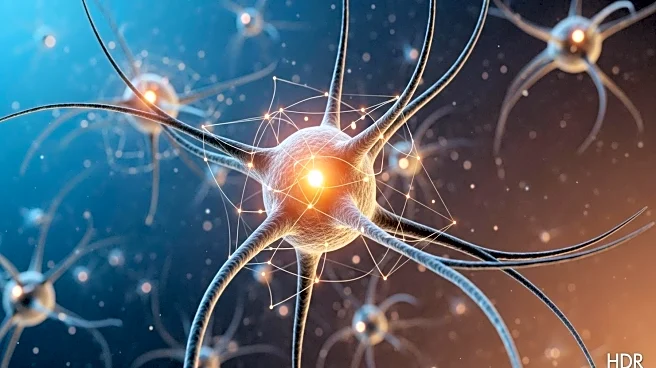What is the story about?
What's Happening?
Neuroscientist Nicholas Wright has released a book titled 'Warhead,' which delves into the neuroscience behind warfare and decision-making in conflicts. The book examines how human brains influence and are influenced by war, providing insights into the minds of those responsible for navigating international confrontations. Wright, who has advised the US Pentagon Joint Staff, argues that our experience of conflict has significantly shaped human evolution, akin to the discovery of fire. He explores various parts of the brain, such as the cerebellum and brainstem, which house drives essential for survival. Wright uses historical examples, like France's decision during World War II, to illustrate how primal brain responses can impact conflict outcomes. He suggests that understanding these brain functions is crucial as wars increasingly involve military technology and artificial intelligence.
Why It's Important?
The book 'Warhead' offers a unique perspective on the role of neuroscience in warfare, highlighting the importance of understanding human decision-making processes in conflict situations. This insight is particularly relevant as modern warfare evolves with technological advancements, including artificial intelligence. Wright's research underscores the need for wisdom, self-knowledge, and emotional regulation among leaders, qualities that are essential for effective conflict resolution. The book challenges pacifist views and emphasizes the inevitability of war due to human wiring and competition. As geopolitical tensions rise, such as the recent Russian drone incidents and ongoing conflicts in Gaza, Wright's analysis provides valuable context for policymakers and military strategists seeking to navigate complex international relations.
What's Next?
Wright's book suggests that as warfare becomes more technologically driven, understanding the neuroscience behind decision-making will be increasingly crucial. This could lead to new strategies in military training and leadership development, focusing on enhancing emotional regulation and self-awareness among leaders. The insights from 'Warhead' may influence future military policies and strategies, particularly in the context of artificial intelligence and remote warfare. As global conflicts continue to evolve, there may be increased interest in integrating neuroscientific research into military and diplomatic decision-making processes.
Beyond the Headlines
The exploration of neuroscience in warfare raises ethical questions about the use of technology and artificial intelligence in conflict. Wright's book prompts a reevaluation of traditional military strategies and the potential for more humane approaches to conflict resolution. It also highlights the cultural and psychological dimensions of warfare, suggesting that understanding human impulses and blind spots could lead to more effective peace-building efforts. The book's insights may contribute to broader discussions on the role of human psychology in international relations and the potential for reducing large-scale conflicts through better understanding of brain functions.
















